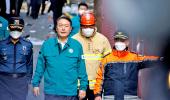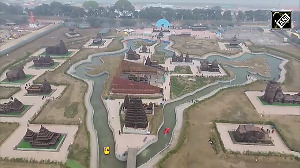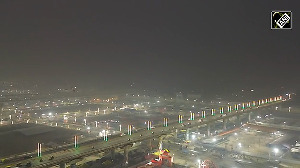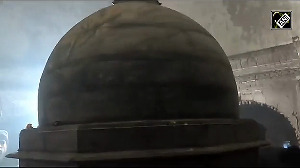South Korean President Yoon Suk Yeol on early Wednesday announced the removal of emergency martial law, following a vote by the National Assembly calling for its termination.

In the wee hours on Wednesday, Yoon's cabinet approved a motion to end martial law enforcement, approximately six hours after Yoon had declared it in response to what he called "anti-state" activities by the opposition, which he claimed were "paralysing" the government.
The emergency declaration raised serious concerns both domestically and internationally.
According to the Yonhap News Agency, the Joint Chiefs of Staff of South Korea confirmed that troops deployed to enforce martial law had returned to their bases, signalling a return to normalcy.
President Yoon explained that the emergency martial law had been declared to protect the nation from anti-state forces attempting to disrupt its functioning and constitutional order. However, after the National Assembly demanded its repeal, he withdrew the troops.
"At 11 p.m. last night, I declared emergency martial law with my resolute intent to save the nation in the face of anti-state forces that attempt to paralyse the nation's essential function and the constitutional order of free democracy," he said as quoted by Yonhap News Agency.
"But there was a demand from the National Assembly for the lifting of martial law; (I) have withdrawn troops mobilised to execute martial law affairs," he added.
Despite the lifting of martial law, members of the opposition escalated their criticism of Yoon, with some threatening to initiate impeachment proceedings against the president.
Hwang Un-ha, floor leader of the Rebuilding Korea Party, condemned the military mobilisation and indicated his intention to push for an impeachment motion.
The martial law declaration shocked the nation and drew strong reactions from the international community, including the US, which expressed "grave concern" over the developments.
However, following the reversal of the martial law declaration, the White House said that it was "relieved" and emphasised that democracy is a cornerstone of the US-South Korea alliance.
"We are relieved President Yoon has reversed course on his concerning declaration of martial law and respected the ROK National Assembly's vote to end it," the National Security Council spokesperson said in a statement, as quoted by Yonhap News Agency.
"Democracy is at the foundation of the U.S.-ROK alliance, and we will continue to monitor the situation," the statement added.











 © 2025 Rediff.com -
© 2025 Rediff.com -